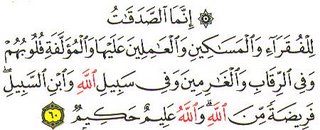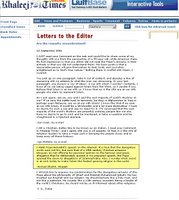
Translation:(They are) those who if We establish them in the land establish regular prayer and give regular charity enjoin the right and forbid wrong: with Allah rests the end (and decision) of (all) affairs
The command is Aqimus Sala i.e. establish prayer which means that Salat is not merely to be offered , but it has to be established. Praying individually is not the norm and one has to pray in congregation. This means that prayer goes beyond the confines of invidual practice and becomes a responsibility of the Islamic state(&/or Muslim community). To establish the salat it is incumbent to organize mosques (their construction, maintenance, expansion, land acquisition), Imams (who lead prayer),Khutbe-Juma (Friday sermons) etc Most of the Muslim countries there is a department or ministry of Awqaf (religious affairs) assigned to do this job.
Similarly zakat is not merely to be paid but has to be established. Amongst the beneficiaries of zakat are the zakat collectors (aamileen e zakat) themselves clearly proving that zakat is not merely an individual deed but a collective function and a state responsibility.
The benefiaries are citied in Chapter 9:60
Translation Alms are for the poor and the needy and those employed to administer the (funds); for those whose hearts have been (recently) reconciled (to truth); for those in bondage and in debt; in the cause of Allah; and for the wayfarer: (thus is it) ordained by Allah and Allah is full of knowledge and wisdom.
To establish the system of zakat, the Islamic state or the Muslim community must collect zakat from the eligible and maintain a zakat fund. After collection it must be distributed to those who qualify as defined by Quran. The collection and distribution should be completely transparent and regularly audited.
Muslims are quite good at establishing Salat, but are lagging behind in the duty for ati uz zaka (paying zakat). Most of them give zakat individually to the needy or poor relatives, as this is indeed the correct thing to do in the absence of collective and organized system of zakat. But just as one cannot be satisfied to pray individually and one should try to establish congregational prayer, similarly if there is no collective system of zakat collection then one must try to establish it or give zakat to people who have established the collective system (centralized collection and distribution) of zakat. This was the system in the era of the Prophet and his successors (the four rightly guided caliphs) and it continued to be a function of Muslim governments until the fall of Ottoman Empire. We need to revive it.
So the message or bottom-line is that one must always give priority to pay zakat to the Muslim state or those who have established a collective system of zakat.Paying zakat individually is similar to praying without congregation and is simply unacceptable in the long run.
Zakat information 1 2
Examples of zakat fund in Muslim countries 1 2
Zakat easy Calculator
Good news a step in the right direction
 It was 10 pm the 3rd of Ramadhan 2006. We did not pay attention to the wailing siren of the fire brigade which was signalling danger and trying to draw our attention to a fire that had broken out somewhere.
It was 10 pm the 3rd of Ramadhan 2006. We did not pay attention to the wailing siren of the fire brigade which was signalling danger and trying to draw our attention to a fire that had broken out somewhere.A few minutes later the door bell rung and we were told to immediately run downstairs as a fire had broken out on the 9th floor of our 14th floor apartment building in the heart of Sharjah.
The fire started with the curtains catching fire beacause of a short circuit while ironing clothes. The fire alarm system failed, the fire extinguisher turned out to be a piece of junk and the water hose remained dry. The fire quickly spread and the fire brigade was called.
I am a laid back kind of guy and told my wife that she should stay put as I went downstairs to see what the row was all about. Almost all the people in our building had come down and my 11th floor neighbour called me on my mobile enquiring about us. When I told him that the kids were sleeping and I had come down alone he insisted that I go back and get all of them down which I did immediately.
I live on the 4th floor and as I moved a little away from the building I could see flames coming out of the 9th floor window. We stood for sometime in the Lulu department store adjecant to our building with the kids playing merrily oblivious of the gravity of the situation. The store closed at 11 pm and so we had to come out. The building is on the main Arooba street connecting Ajman to Sharjah, and soon the traffic and riot police were on the job trying to control the traffic congestion and the teeming enquisitive and restless crowd which seemed to relish every bit of the drama that was unfolding.
The water hose did not have enough pressure to reach the 9th floor and a multi-ladder was required. That came at nearly 11.15 pm as the fire spread in the other rooms of the flat.
The multi ladder did finally manage to hit the burning embers but it took nearly 2 more
hours to completely douse the raging flames.
Everyone was discussing the incident and blaming the apparent flaws in the fire management system and the unacceptable delay in bringing the fire under control. Neighbours offered each other places to spend the night with immense relief at no loss of life. We spent the night at a friend's place 2 blocks away and we were Alhamdolillah lucky to be able to spend the night at his place who served us sumptous food for Sehri.The thoughts that came to my mind were the very obvious fallability and helplessness of man before God and how it is so easy for Him to turn us into refugees in a matter of minutes.
As I reflect more on the incident I thank Allah for having saved all of us from the fire that could have been fatal, had it spread more than it did and I also thank the authorities who doused the fire and performed their duties as best as they could with the resources at their disposal.
May Allah save us all from the Fire Thank you and God bless.
The above was reported in a local daily.

Q1) Who is the Pope?
Click the words answer1 answer2 to find out.
Q2) What did he say?
Click the words answer1 answer2 to find out.
Q3) Was it offensive?
YES
Q4) Should the Pope apologize?
YES
Q) Why should he apologize?
He gave a prepared speech to a university audience in Germany. Delving on the topic of spreading faith by force and violence the venerable pontiff quoted a 14th century Christian emperor who derided the Prophet(pbuh) and Islam. The Pope then failed to express his personal views on those derogatory remarks, implying that his views were not dissimilar to the ones he quoted.
Q) What has been the Vatican response so far?
Chief Vatican spokesman Federico Lombardi said in a statement."The pontiff had not intended to offend Muslims. It certainly wasn't the intention of the Pope to carry out a deep examination of jihad (holy war) and of Muslim thought on it, much less to offend the sensibility of Muslim believers.It is clear that the Holy Father's intention is to cultivate a position of respect and dialogue towards other religions and cultures, and that clearly includes Islam." (* this is a poor attempt to explain, no regrets no apology)
Q5) What is the Muslim response so far?
- Pakistan summoned the Vatican's ambassador to express regret over the remarks, as parliament passed a resolution condemning the comments
- The head of the Muslim Brotherhood said the remarks "aroused the anger of the whole Islamic world"
- Palestinian Prime Minister Ismail Haniya condemned the Pope's comments
- In Iraq, the comments were criticised at Friday prayers by followers of radical Shia cleric Moqtada al-Sadr
- The 57-nation Organisation of the Islamic Conference said it regretted the Pope's remarks
- News Item
Q6) What should be the Muslim response? Of course we need to protest peacefully and demand an apology but more important we need to prepare ourselves to answer any concerns regarding Islam and the Prophet(pbuh).
Q7) Did Islam spread by the sword? Answer1 Answer2
Q11) What do non-Muslims say about the Prophet(pbuh) Answer
Point) Information on conversion to Islam. Info1 Info2
My letters to the Editor in the Khaleej Times a local daily is shown below
| As I have been suggesting in previous posts; we need to get into mainstream media with state of the art advertising to convey our message.I created a small ad in powerpoint, converted it into a video .avi file and then edited and split using video editor, before finally uploading it through Google Video.InshaAllah more details on zakat in forth coming posts. | |
This advertisement is one the many that should be published in the Holy month of Ramadhan. Some important must read links on the Quran

To the right you see a surveillance camera? Imagine billions of these watching each and every movement of yourself. These cameras are not only filming you but are also making backups to play them out to you in the Hereafter.
Allah says in the Holy Quran Sura Hajj 22:61

Translation: That is because Allah merges Night into Day and He merges Day into Night and verily it is Allah Who hears and sees (all things).
Allah says in the Holy Quran Sura Tagabun 64:4
Translation: He knows what is in the heavens and on earth: and He knows what ye conceal and what ye reveal: yes Allah knows well the (secrets) of (all) hearts.
Allah says in the Holy Quran Sura Baqara 2:77
In this and many other aayaat of the Quran, Allah describes Himself as As-Samee (One Who listens to all) and Al-Baseer(All Seeing).
These are also amongst the Asma-e-Husna (the beautiful Names of Allah) that demand reflection and contemplation.
Pondering on these attributes of Allah alone should make us God conscious and God fearing (Muttaqee) as we realize that whatever we do in this world is being recorded and will act as a witness in favor or against us in the Hereafter.
May Allah guide us all Amin.

Salam alykum
Blogging is slowly becoming an obsession. I realize that blogging has many dimensions that need to be explored and used to make yourself seen heard and felt.
This post contains a podcast on How to prepare and give a Dars e Quran (lesson on Quran). Duration is 29 mns 03 secs and is in Urdu
Deliverd by Khurram Murad, one of the most outstanding Islamic personalities of this century.
Useful to Mudarris Hazraat (those who give Quranic lessons).
Click the Play icon to listen
Some links that talk about the therapeutic benefits of fasting.
Some (read Hindu nationalists and a miniscule Muslim element) insist that all Indians must be compelled to recite VM irrespective of their religious affiliation and sensitivity. Any reservations attract diatribes of being anti national. Others (read secular Hindus) want everyone to recite VM but prefer to keep it optional and do not take singing VM to be a proof of ones patriotism. There are some secular Muslims who have no problems reciting VM and some who see it as an affront to ones faith and refuse to equate it with patriotism.
The VM controversy ignited when the Federal government backed off from an earlier instruction sent to all schools and colleges to observe the 7th September 2006 as VM centenary day by ensuring compulsory singing of VM. The singing was later made optional sensing Muslim unease and the potential political cost. This sparked an outrage amongst Hindu nationalists who saw a clear cut case of cultural nationalism and minority appeasement. The states that they govern would implement the Federal government’s earlier edict and force all to sing VM on its centenary. Some Muslim bodies and leaders are threatening a boycott of the VM celebrations as the issue blows out of proportions.
The VM backers have no rationale or explanation to make it compulsory. It is only rhetoric and jingoism. Vote-bank politics and the surreptitious ploy to keep people and the media away from the real issues of poverty, unemployment and education seem to be the only pursuit of a decadent political class. Let us grant issues the merit they deserve. Let us all work towards a strong, stable and successful India but not at the cost of each others fundamental rights.



